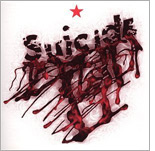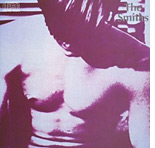Rip It Up and Start Again
Hi Steve,
Thanks for your kind words about Rip It Up. I am glad you used the word "affection" because that is really how I came to feel about pretty much everyone involved in postpunk—the musicians, but also the behind-the-scenes catalyst figures who started labels, managed bands, promoted festivals. All these people could have taken a much easier path, but they chose to make things difficult for themselves by trying to do something interesting and new. Writing the book, I wanted to provide a context that would allow these people and their ideas to shine, and also to build a framework through which you could see the connections—so it all felt like a movement, a gigantic collective project, rather than just disparate activity.

I did feel like I was "on their side," and maybe this begins to answer your question about whether the rampant experimentalism generated that much in terms of lasting listenability. Yes, there was a fair amount of willful weirdness going on, but a great spirit pervaded it all, which I find both inspiring and touching, even when the experiments were failures. And although "affection" is possibly an odd word to use in reference to a bunch of nihilists, I do feel fond of the No Wave people. James Chance's music actually stands up really well, I think; there are great moments throughout Lydia Lunch's long discography, and Suicide's records are just beautiful. (Listen to James Chance & the Contortions, "Contort Yourself," 1979; and Suicide, "Touch Me," 1980.) DNA and Mars are extremists even within something as extreme as No Wave, and although their records aren't exactly on my turntable constantly, I admire their attempts to create something completely without precedent. I agree with Eno's remark about how pioneers like the No Wavers provide a useful service: They mark out the edge of a terrain, and then later bands come along to cultivate it and do something more listener-friendly with their ideas. That's what Sonic Youth did; they took No Wave's hair-raising guitar glissandi and psychotic vocals and fed that into something more song-oriented and rocking.
You asked about Orange Juice and my book title. Apart from being one of my absolute favorite singles from that period, the song's chorus "rip it up and start again" was so perfect because it suggests both postpunk's destructive impulse to reject tradition, and also its constructive, forward-looking side—people starting independent labels or embracing new technology like synths. Rip it up/start again was the dynamic running through the entire era, the motor of constant change: Whenever things settled into orthodoxy, there'd be a schism, a new fork in the path—anything just to keep things moving. So postpunk reacted against punk's rock 'n' roll traditionalism; then, a few years later, when postpunk itself became codified as a style of dour, difficult music, you had the "New Pop" movement—groups like Orange Juice, Human League, ABC—who embraced melody and brought back the love song. And a few years after that, when New Pop itself got bland and bloated, musicians took a whole bunch of new directions in response, such as Goth, or the new rock of "glory boy" bands like U2 and Echo & the Bunnymen. The song "Rip It Up" itself was written when Orange Juice had grown disillusioned with how New Pop had degenerated into the vapidity of Wham! and Duran Duran. But almost all these groups, even Duran Duran actually, had some connection to punk—it was the Sex Pistols, typically, that had fired them up in the first place. Which is why I feel that 1978-1984 is one unified epoch, "postpunk." It's just that the New Pop phase was a revolt against a certain narrow definition of postpunk that had set in—bleak, racked by existential angst or political guilt, puritanical. A revolt into hedonism and positivity.
Orange Juice and their label Postcard were also among the very first people to come out of postpunk who manifested a new ambitious spirit of wanting to have hits rather than skulking morosely in the underground. So, as a child of that era, I would actually agree with you when you question that indie notion that the embrace of the mainstream always ruins music. Some groups only make sense as big bands—the Clash is one example; so is U2. And there's a sense in which, if bands really believe in what they're doing, they won't be satisfied with being cult artists, they want to reach as large an audience as possible. That's why so many of the postpunk bands decided to adopt a more glossy, accessible sound, to explore the potential of video and new technology like synths and drum machines.
I've noticed that quite a few Americans are resistant to the idea that there's any connection between, say, the agit-funk of Gang of Four and the glam-disco of ABC. That's a big impetus behind Rip It Up: to show that it was all one movement, one long cultural moment. The evolution of a band like Scritti Politti, a bunch of communist squat-dwellers making fractured, avant-garde music, into Billboard Top 20 stars, proves there's a continuum there, as does the transformation of Joy Division into New Order.

The spirit of the age? Weirdly, given that the period was full of songs with titles like "Death Disco" or "Isolation" or "We Are All Prostitutes," I think it was actually optimism, confidence, a certain will-to-power. Charged up by punk, these groups really believed they could change things, they could actually take over in some sense—whether it was by building an alternative culture, as with postpunk, or, with New Pop, invading the mainstream and displacing Old Pop, as it were. By the time the Smiths and the Replacements came along, there was much more of a sense of defeat and exile and being out-of-time. A colleague of mine described the Smiths as being "against the '80s"—for a long while they refused to do videos, for instance. Same with the Replacements, whether it's the "lost generation" idea behind songs like "Bastards of Young" or the fact that they did a bunch of videos that were anti-promotional—you couldn't actually see the band members. And, you know, I loved both those bands, and in a sense, agreed with those gestures—that self-defeating refusal to play the game, to put yourself across well on MTV, felt timely and appropriate in the mid-'80s. But it's a whole different spirit from postpunk.
But perhaps this is a British person's perspective. I get the impression that postpunk in America was always much more of an underground phenomenon. Growing up in the U.K., you would see PiL and Joy Division on TV; they'd even have the occasional hit single. "Pop" has just never been such a dirty word in Britain as it has been for most American fans of left-field music. There was always a tradition of weird, arty groups having hits—Roxy Music, Bowie, or even Sparks, an American group that was huge in England but never got anywhere near the Billboard Top 40. So, in the U.K., I think there is this abiding sense in which "pop" has been thought of as something that could be reclaimed. Whereas in America the default position for fans of alternative music is feeling like the permanent opposition. Would you say that's a fair comment?
Simon